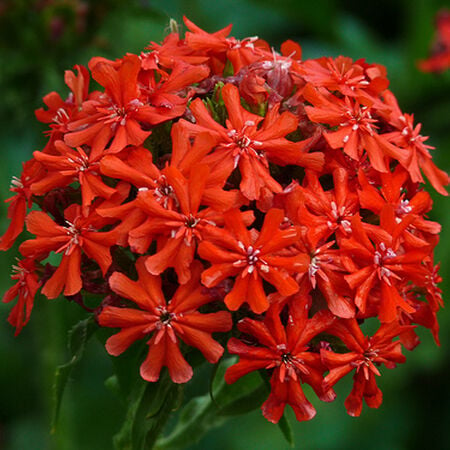Burning Love, Lychnis Seeds
Key Attributes
Key Attributes
Product Details
Weight
0.008Depth
0.1Height
4.5Width
3.25Plant Height
2-3'Botanical Name
LychnisSeed Type
SeedAdditional Characteristics
Attracts Pollinators, Attracts BirdsSeeds Per Gram
1,877Seeds Per Pound
851,200Packet
50 SeedsSow Depth
Top of SoilSeeds Per Ounce
53,200Breed
Open-pollinatedSun
Full SunLife Cycle
PerennialSow Method
TransplantCategories
FlowersDays To Maturity (# Days)
365Components
Growing Instructions
![]() Learning Download: How to Grow Lychnis
Learning Download: How to Grow Lychnis
The Lychnis plant is a perennial that grows best in USDA Hardiness Zones 3-10. It can reach up to 32 inches high, and it typically blooms red with a silvery-gray foliage cover.
Before Planting: Lychnis seed can be planted directly into the garden, and the benefit from being prechilled in the refrigerator for two weeks before they are sown in the garden.
Planting: Direct sow the seeds in average soil after all danger of frost have passed. When planting, barely press the seeds into the soil, because light aids in germination, and space the seeds 8 inches apart.
Watering: Water the plants at least once a week, and be sure to water early in the morning to give the leaves time to dry.
Fertilizer: Fertilize Lychnis in the spring to encourage the plant’s blooming season. When fertilizing, be sure to use a fertilizer high in phosphorous.
Days to Maturity: Lychnis begin to bloom in the late spring and lasts throughout the summer.
Harvesting: Lychnis can be added to cut flower bouquets for a flash of color.
Tips: During its growing season, be sure to keep weeds under control and apply an organic mulch of aged bark or shredded leaves to maintain a natural look.
Shipping Schedule
Our Seed Promise
 "Agriculture and seeds" provide the basis upon which our lives depend. We must protect this foundation as a safe and genetically stable source for future generations. For the benefit of all farmers, gardeners and consumers who want an alternative, we pledge that we do not knowingly buy or sell genetically engineered seeds or plants.
"Agriculture and seeds" provide the basis upon which our lives depend. We must protect this foundation as a safe and genetically stable source for future generations. For the benefit of all farmers, gardeners and consumers who want an alternative, we pledge that we do not knowingly buy or sell genetically engineered seeds or plants.
The mechanical transfer of genetic material outside of natural reproductive methods and between genera, families or kingdoms, poses great biological risks as well as economic, political, and cultural threats. We feel that genetically engineered varieties have been insufficiently tested prior to public release. More research and testing is necessary to further assess the potential risks of genetically engineered seeds. Further, we wish to support agricultural progress that leads to healthier soils, to genetically diverse agricultural ecosystems, and ultimately to healthy people and communities.
To learn more about the "Safe Seed Pledge" please visit www.councilforresponsiblegenetics.org.

